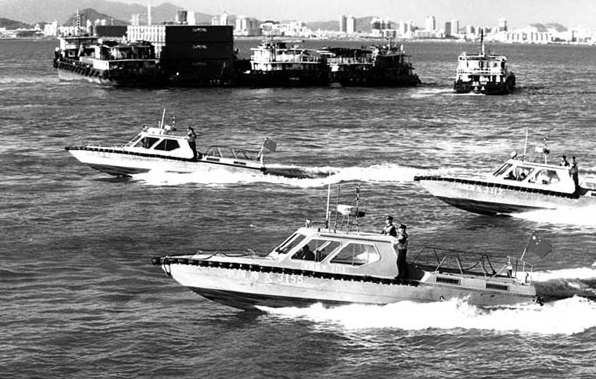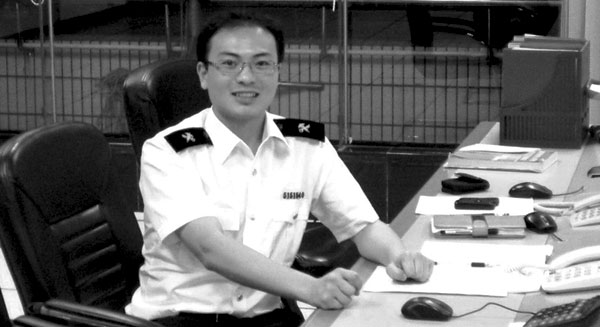Lonely outpost
Updated: 2013-10-23 07:23
By Li Wenfang (China Daily)
|
|||||||||||
On a small island just a few miles from Hong Kong, a Chinese customs team fights an important battle against smuggling. Li Wenfang reports on Dachan Island, Guangdong province.
Twenty-five-year-old Luo Jie, who studied at a US university and worked at a five-star hotel in Guangzhou, joined Guangzhou Customs in 2010 hoping to have a stable, respected and financially rewarding job. He did not expect to end up on an island inhabited only by staff of the customs bureau, an oil company and a power plant.
He was assigned to Dachan Customs and posted on 0.92-square-kilometer Dachan Island, off She-kou area in Shenzhen, Guangdong province. He soon found himself jumping from the customs speedboat onto cargo vessels swaying at anchorage for anti-smuggling checks.
It's not easy work. In March, he climbed into containers stuffed with scrap metals, where it was more than 40 C and stank horribly, to search for prohibited items - waste batteries this time.
|
Dachan Customs' speedboats patrol on the sea. Photos provided to China Daily |
|
Luo Jie, 25, says he is emotionally attached to the 0.92-sq-km Dachan Island, where he works as a customs officer. |
The challenges have become part of Luo's daily life. "It's frustrating to be awakened at 2 or 3 am often to check vessels," he says. "I have been losing hair because of that."
An Internet connection was not available at his workplace until 2011. Even now, "Internet games are impossible because of the slow speed," Luo says.
Modern amenities came late to the island.
Tap water was not available for the customs station until 2008. Before that, fresh water was shipped by boat after the well water was found to contain a lot of heavy metals. Realgar, an indigenous arsenic sulfide mineral, is used to drive away snakes.
Grid power became accessible in 2010, before which the customs station used its own generators.
Food for the 182 staff members is mostly transported by boat to the island.
Some sections of the path around the customs buildings were destroyed and power supply cut off by the typhoon Usagi last month.
A critical post
Despite its sense of isolation, the island is only 6 nautical miles from Hong Kong, situated in the Lingding Sea off the mouth of the Pearl River. The location is so important for anti-smuggling efforts that a customs office was set up in 1899 by the Qing Dynasty (1644-1911) government.
Dachan Island stands on a brisk trading route, as Guangdong contributes more than a quarter of the Chinese mainland's foreign trade. That share was valued at $983.82 billion last year, though some of that trade is conducted through Hong Kong. Imports between Guangdong and Hong Kong surged 17.8 percent to $227.79 billion last year.
Customs is charged with preventing registered vessels under 3,000 deadweight tons from offloading cargo before they arrive at their destination ports.
Since Hong Kong is a free port, anti-smuggling work is especially important at Dachan Customs.
This midway supervision, affecting 110,000 vessels per year, accounts for 80 percent of midway supervision at sea by the mainland, and is connected to 66 checkpoints in Guangdong and the Guangxi Zhuang autonomous region, according to Guang Zhan, chief of the customs station.
Luo's supervision division is responsible for checking selected registered cargo vessels at the anchorage.
Vessel jumping can be more dangerous for the customs' anti-smuggling police officers. Crews of some moving cargo ships take drastic measures to avoid being boarded and checked.
"It's dark at night on the sea and we sometimes spot vessels with our ears," says Zhai Jin, an anti-smuggling police officer.
Modern work
Since 2002, the staff has been using global positioning system technology to monitor the shipping routes of the registered vessels and checking about 2 percent of them at the anchorage. Before that, officers boarded every vessel for checking.
The busiest time is between midnight and 4 am. Each day, the staff checks the customs manifest information for about 200 to 300 cargo vessels, replays vessel paths, identifies suspicious vessels and issues go-ahead signals.
The station also checks the natural gas shipped through a pipeline from western China to Hong Kong by China National Petroleum Corp.
Since 2010, the customs unit has supervised 347,267 vessels, boarding 7,426 of them for checking, and cracked 843 smuggling cases involving avoided duty of 4 billion yuan ($656.5 million).
Smuggled imports include diesel, high-value electronic products, cars and drugs, says Liu Haichuan, head of the anti-smuggling police at the customs unit.
Despite the difficulties and low pay - Luo earns a fraction of what he earned at his hotel job - many customs officials stay on the island for an extended time, although they can choose to leave the island every year.
"I'm now emotionally attached to the island. I enjoy working here. It gives me a sense of honor as a customs officer," Luo says, adding that working with the Guangzhou headquarters means opportunity for career growth.

"I plan to stay here for another five to six years," says Luo, who will soon marry his high school sweetheart in nearby Jiangmen.
Luo likes the relatively simple and quiet off-work life on the island, which includes basketball, badminton and swimming. He is memorizing the entries in the Oxford dictionary to improve his English.
Island life has drawn the customs people closer. Farewells are always emotional. Dogs, totaling 12 at the customs, mean more to people than in other places.
"We have an overflow of love here," customs chief Guang says.
"Life is difficult. We have the name of every person who has worked here inscribed on the wall."
Contact the writer at liwenfang@chinadaily.com.cn.
(China Daily 10/23/2013 page20)
Today's Top News
China, Russia reach big oil deal
Apple unveils new Macs, iPad
Officials promote power relations
Home prices rise further in Sept
Big challenges lie ahead for urban planners
Firms urged to contact unions abroad
Smart cities to aid urbanization
UN films highlight rise in HIV cases among women
Hot Topics
Lunar probe , China growth forecasts, Emission rules get tougher, China seen through 'colored lens', International board,
Editor's Picks

|

|

|

|

|

|







